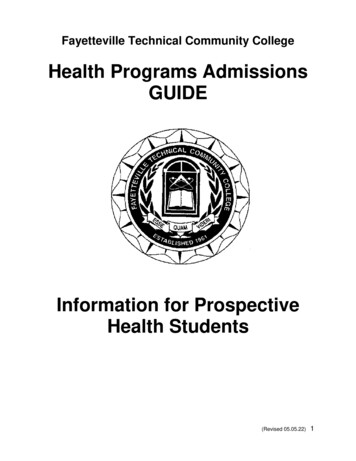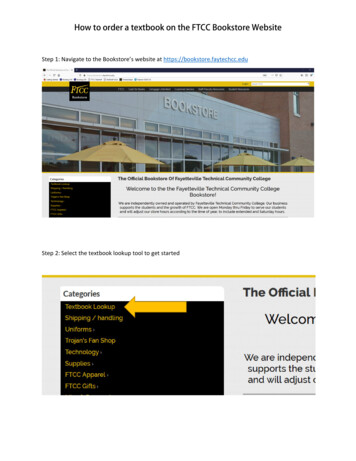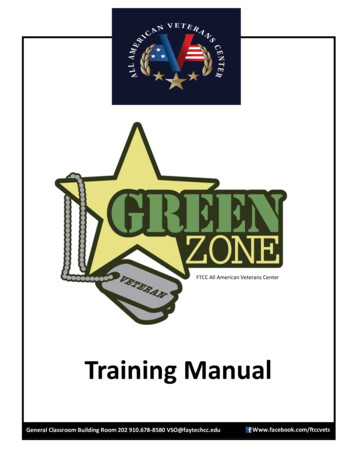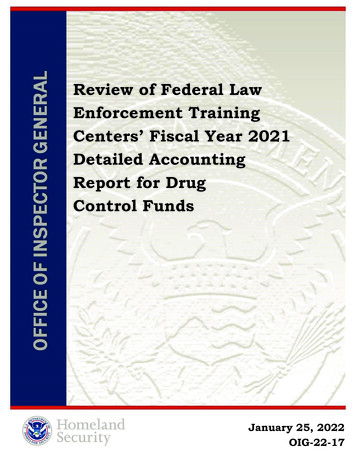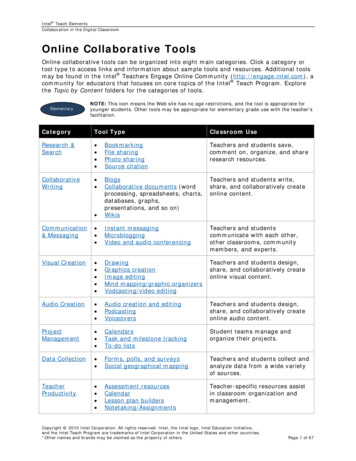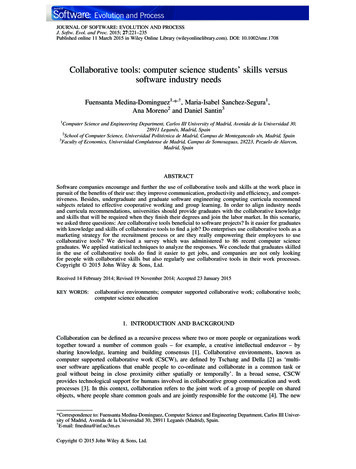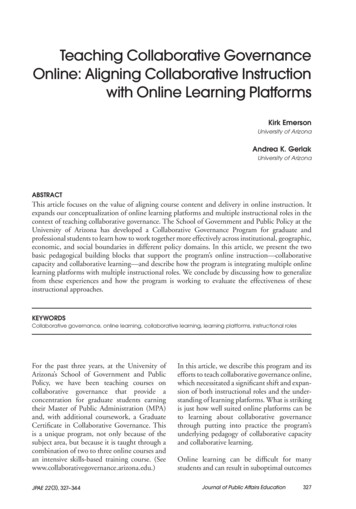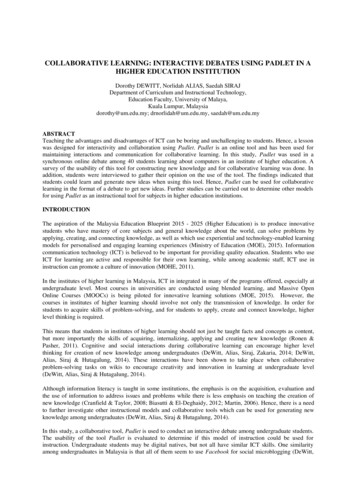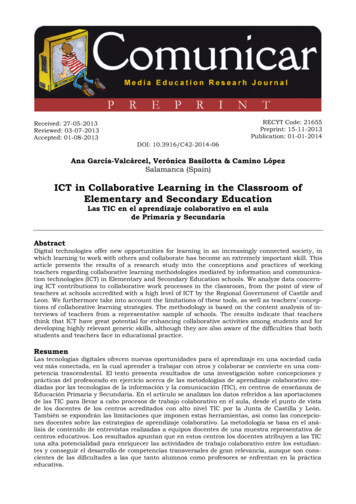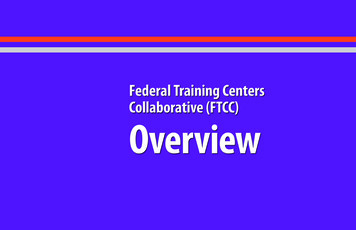
Transcription
Federal Training CentersCollaborative (FTCC)Overview
IntroductionThe members of the Federal Training Center Collaborative (FTCC) are federallyfunded training and technical assistance centers with complementarymissions. The FTCC is committed to the goals of 1) increasing collaborationin the prevention and treatment of Sexually Transmitted Diseases (STDs),Human Immunodeficiency Virus (HIV)/Acquired Immunodeficiency Syndrome(AIDS), Viral Hepatitis, Tuberculosis (TB), behavioral health disorders, andthe management and promotion of sexual and reproductive health; and2) maximizing the use of federal resources to help meet the training andorganizational capacity building needs of the health care and public healthworkforce engaged in promoting health and reducing health disparities.This document introduces you to each member of the FTCC and its structure,scope of work, target audience, and national priorities. More informationregarding training and technical assistance services can be found on eachmember’s website.
Members of the Federal Training Centers Collaborative (FTCC) OverviewAIDS Education and Training Centers (AETCs): www.aidsetc.orgFunding Source StructureScope of workTarget Audience(s)National PrioritiesHealth Resourcesand ServicesAdministration/HIVAIDS Bureau (HRSA/HAB) The AETC Program is a network of clinical trainingand technical assistance centers that providecustomized resources and expertise to health careproviders. These resources help build their capacityto deliver high quality HIV/AIDS care throughout theUnited States. PhysiciansPhysician AssistantsAdvanced Practice NursesNursesPharmacistsOral health providersMedical case managersOther members of thehealthcare team Health Profession Students National HIV/AIDS Strategy Affordable Care Act Expansion of the HIV workforceand the promotion of qualitycare for all Reaching and linking to carevulnerable populations Utilization of National HIVtreatment guidelines andevidenced-based methods Engagement in Care Primary and secondary HIV/STIprevention 11 Regional Training Centers 100 Local Performance Sites (LPS) 3 National Centers AETC National Resource Center AETC National Evaluation Center National HIV/AIDS Clinicians’Consultation Center 9 Telehealth Training Centers 8 Graduate/Health ProfessionTraining Programs 1 International Training Center(I-TECH) The AETCs work by translating national researchand best practices to the local level. They buildrelationships with healthcare teams and help themunderstand how to tailor best practices for theparticular needs of persons living with or at-risk ofHIV in their communities.Addiction Technology Transfer Centers: http://www.attcnetwork.orgFunding Source StructureScope of workSubstance Abuseand MentalHealth ServicesAdministration(SAMHSA) Technology transfer including translationof research into tools that can be usedby providers for implementing evidencebased practice, information dissemination,training and technical assistance (TA)on EBP and TA evidence-based practice(EBP) on implementation for providers ofaddiction treatment and recovery supportservices 10 Regional Centers 4 Focus Area Centers 1 Network Coordinating OfficeTarget Audience(s) Addiction counselorsRecovery support workersHealth professionalsAcademicsState and local governmentofficialsNational Priorities Workforce development for theexisting addiction treatment andrecovery work force. Pre-service training for peopleconsidering working in addictionand recovery including medical andnursing students. Increasing access to training andtechnical assistance via increaseduse of multiple platforms includinge-learning and mobile devices.3
Members of the Federal Training Centers Collaborative (FTCC) OverviewNational Network of STD/HIV Prevention Training Centers (NNPTC): www.nnptc.orgFunding Source StructureCenters of DiseaseControl andPrevention (CDC)/Division of HIV/AIDSPrevention (DHAP)and Division of STDPrevention (DSTDP)Scope of workTarget Audience(s) 8 Clinical The NNPTC is a CDC-funded group of regional centersPreventioncreated in partnership with health departments andTreatment Centersuniversities. The PTCs are dedicated to increasing the(PTCs)knowledge and skills of health professionals in the 5 Behavioral PTCsareas of sexual and reproductive health. 3 Partner Service The NNPTC provides health professionals withPTCsa spectrum of state-of-the-art educational 1 Nationalopportunities including experiential learning with anResource Centeremphasis on prevention. National PrioritiesPhysiciansPhysician AssistantsAdvanced Practice NursesNursesOther members of the healthcare teamPrevention providersSTD/HIV Program ManagersDisease Intervention SpecialistFederal, state, and local public health professionals National HIV/AIDS Strategy CDCs High Impact Prevention(HIP) 2010 STD Treatment Guidelines DHAP/DSTDP Strategic Plan Sexual Health HIV/STD prevention in clinicalsettingsSTD-related Reproductive Health Training and TA Centers (STDRHTTACs): ng Source StructureCooperativeagreementbetweenDHHS/Officeof PopulationAffairs and theCenters forDisease Controland Prevention,Division of STDPrevention 9 regional training centers that cover DHHS RegionsI-X 4Scope of work The STDRHTTACs are charged with providing trainingand TA to state, local, territorial, and tribal, STD, Title Xfamily planning and public health laboratory programsAll 9 regional training centers provide trainingto strengthen program management and delivery ofand technical assistance regarding billing&STD services, and to improve the quality of reproductivereimbursement and chlamydia/gonorrhea prevalencehealth-related STD services.monitoringKey Activities for the STDRHTTACs include:(Region 1 - JSI Research and Training Institute, Inc.)Billing & Reimbursement Toolkit Development Providing training and TA for billing and reimbursementsystems in state and local STD programs and public(Region VI - Cardea) Prevalence Monitoring Toolkithealth laboratories, as well as family planning clinics;Developmentsupporting STD prevalence monitoring among family(Regions IX and X – Cardea) Evaluation project on riskplanning clinics; delivering provider education trainings;factors for CT infection in women over 25 years of ageand disseminating and supporting implementation ofbest practices.Target Audience(s)National Priorities STD, Title X familyplanning, and publichealth laboratoryprograms Federal, state, andlocal public healthprofessionals whoprovide STD services. Programadministrators andmanagers Clinic administratorsand managers Clinicians Sexual andReproductive Health Infertility Prevention Provide training andTA in accordancewith DHAP/DSTDPStrategic Plan,National HIV/AIDSStrategy, and 2010STD TreatmentGuidelines
Members of the Federal Training Centers Collaborative (FTCC) OverviewTB Regional Training and Medical Consultation Centers http://www.cdc.gov/tb/education/rtmc/Funding Source StructureScope of workTarget Audience(s)Centers forDisease Controland Prevention/Division ofTuberculosisElimination Creates, enhances and disseminates state-ofthe-art resources and models of excellenceand performs research to control andeliminate tuberculosis in the United States andinternationally. We develop and deliver highlyversatile, culturally appropriate trainingsand educational products, and providetechnical assistance. We also provide medicalconsultation to clinicians. 5 RegionalTrainingand MedicalConsultationCenters (RTMCCs)PhysiciansPhysician AssistantsAdvanced Practice NursesNursesOther members of the healthcare teamTB Program ManagersDisease Control InvestigatorsFederal, state, and local public healthprofessionalsNational Priorities Provide training and technical assistance toincrease human resource development inTB programs Develop TB educational materials (https://sntc.medicine.ufl.edu/rtmccproducts.aspx) Provide medical consultation to TBprograms and medical providersTitle X National Training Centers: www.fpntc.orgFunding Source StructureScope of workTarget Audience(s)Department ofHealth & HumanServices (DHHS),Office, Officeof PopulationAffairs, Office ofFamily Planning Enhance the capacity ofTitle X family planninggrantees and agenciesto deliver reproductivehealth services to theTitle X community andbeyond. 5 National Training Centers (NTCs):1. NTC–Center for Coordination andStrategic Initiatives2. NTC–Center for Family PlanningService Delivery3. NTC–Center for Quality Assurance,Quality Improvement & Evaluation4. NTC–Center for Management SystemsImprovement5. National Clinical Training CenterTitle X family planning granteesFamily planning providersPhysiciansPhysician AssistantsAdvanced Practice NursesNursesOther members of the healthcareteamNational Priorities Each NTC has specific areas of expertise and isresponsible for developing and delivering trainingand technical support to the Title X grantees incoordination with other NTCs. Together, the NTCs areseeking to ensure that personnel working in Title Xfamily planning service projects have the knowledge,skills, and abilities necessary to effectively deliverhigh quality family planning services in accordancewith Title X laws, regulations, policies, and nationallyrecognized medical standards.5
Members of the Federal Training Centers Collaborative (FTCC) OverviewViral Hepatitis Education and Training Projects: nding Source StructureScope of workTarget Audience(s)Centers ofDisease Controland Prevention/Division of ViralHepatitis National website offering interactivecase studies and on demand webinarswith continuing education (CE), a slidelibrary with presentations available fordownloading, and a visual glossary ofdefinitions and terms. 2 National Training CentersPhysiciansPhysician AssistantsAdvanced Practice NursesNursesMedical case managersFederal, state, and localpublic health professionalsNational PrioritiesEducation and training on the managementof viral hepatitis
Rev 9/11/13
This document was created by the following partners:
Office, Office of Population Affairs, Office of Family Planning 5 National Training Centers (NTCs): 1. NTC-Center for Coordination and Strategic Initiatives 2. NTC-Center for Family Planning Service Delivery 3. NTC-Center for Quality Assurance, Quality Improvement & Evaluation 4. NTC-Center for Management Systems Improvement 5.
